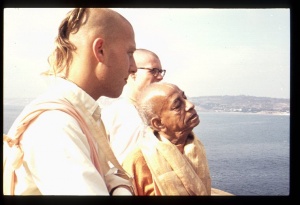SB 9.6.6: Difference between revisions
m (1 revision(s)) |
(Vanibot #0054 edit - transform synonyms into clickable links, which search similar occurrences) |
||
| (One intermediate revision by one other user not shown) | |||
| Line 1: | Line 1: | ||
{{info | {{info | ||
|speaker= | |speaker=Śukadeva Gosvāmī | ||
|listener=King | |listener=King Parīkṣit | ||
}} | }} | ||
[[Category:Srimad-Bhagavatam - Canto 09 Chapter 06|s06 ]] | |||
[[Category:Bhagavatam Verses Spoken by Sukadeva Gosvami - Vanisource|090606]] | |||
<div style="float:left">'''[[Srimad-Bhagavatam]] - [[SB 9|Ninth Canto]] - [[SB 9.6: The Downfall of Saubhari Muni|Chapter 6: The Downfall of Saubhari Muni]]'''</div> | |||
<div style="float:right">[[File:Go-previous.png|link=SB 9.6.5]] '''[[SB 9.6.5]] - [[SB 9.6.7]]''' [[File:Go-next.png|link=SB 9.6.7]]</div> | |||
{{RandomImage}} | |||
==== TEXT 6 ==== | ==== TEXT 6 ==== | ||
<div | <div class="verse"> | ||
sa ekadāṣṭakā-śrāddhe | :sa ekadāṣṭakā-śrāddhe | ||
ikṣvākuḥ sutam ādiśat | :ikṣvākuḥ sutam ādiśat | ||
māṁsam ānīyatāṁ medhyaṁ | :māṁsam ānīyatāṁ medhyaṁ | ||
vikukṣe gaccha mā ciram | :vikukṣe gaccha mā ciram | ||
</div> | </div> | ||
| Line 17: | Line 22: | ||
==== SYNONYMS ==== | ==== SYNONYMS ==== | ||
<div | <div class="synonyms"> | ||
''[//vanipedia.org/wiki/Special:VaniSearch?s=saḥ&tab=syno_o&ds=1 saḥ]'' — that king (Mahārāja Ikṣvāku); ''[//vanipedia.org/wiki/Special:VaniSearch?s=ekadā&tab=syno_o&ds=1 ekadā]'' — once upon a time; ''[//vanipedia.org/wiki/Special:VaniSearch?s=aṣṭakā&tab=syno_o&ds=1 aṣṭakā]-[//vanipedia.org/wiki/Special:VaniSearch?s=śrāddhe&tab=syno_o&ds=1 śrāddhe]'' — during January, February and March, when offerings are made to the forefathers; ''[//vanipedia.org/wiki/Special:VaniSearch?s=ikṣvākuḥ&tab=syno_o&ds=1 ikṣvākuḥ]'' — King Ikṣvāku; ''[//vanipedia.org/wiki/Special:VaniSearch?s=sutam&tab=syno_o&ds=1 sutam]'' — to his son; ''[//vanipedia.org/wiki/Special:VaniSearch?s=ādiśat&tab=syno_o&ds=1 ādiśat]'' — ordered; ''[//vanipedia.org/wiki/Special:VaniSearch?s=māṁsam&tab=syno_o&ds=1 māṁsam]'' — flesh; ''[//vanipedia.org/wiki/Special:VaniSearch?s=ānīyatām&tab=syno_o&ds=1 ānīyatām]'' — bring here; ''[//vanipedia.org/wiki/Special:VaniSearch?s=medhyam&tab=syno_o&ds=1 medhyam]'' — pure (obtained by hunting); ''[//vanipedia.org/wiki/Special:VaniSearch?s=vikukṣe&tab=syno_o&ds=1 vikukṣe]'' — O Vikukṣi; ''[//vanipedia.org/wiki/Special:VaniSearch?s=gaccha&tab=syno_o&ds=1 gaccha]'' — immediately go; ''[//vanipedia.org/wiki/Special:VaniSearch?s=mā&tab=syno_o&ds=1 mā] [//vanipedia.org/wiki/Special:VaniSearch?s=ciram&tab=syno_o&ds=1 ciram]'' — without delay. | |||
</div> | </div> | ||
| Line 24: | Line 29: | ||
==== TRANSLATION ==== | ==== TRANSLATION ==== | ||
<div | <div class="translation"> | ||
During the months of January, February and March, oblations offered to the forefathers are called aṣṭakā-śrāddha. The śrāddha ceremony is held during the dark fortnight of the month. When Mahārāja Ikṣvāku was performing his oblations in this ceremony, he ordered his son Vikukṣi to go immediately to the forest to bring some pure flesh. | During the months of January, February and March, oblations offered to the forefathers are called aṣṭakā-śrāddha. The śrāddha ceremony is held during the dark fortnight of the month. When Mahārāja Ikṣvāku was performing his oblations in this ceremony, he ordered his son Vikukṣi to go immediately to the forest to bring some pure flesh. | ||
</div> | </div> | ||
__NOTOC__ | |||
<div style="float:right; clear:both;">[[File:Go-previous.png|link=SB 9.6.5]] '''[[SB 9.6.5]] - [[SB 9.6.7]]''' [[File:Go-next.png|link=SB 9.6.7]]</div> | |||
__NOTOC__ | |||
__NOEDITSECTION__ | |||
Latest revision as of 16:13, 19 February 2024

A.C. Bhaktivedanta Swami Prabhupada
TEXT 6
- sa ekadāṣṭakā-śrāddhe
- ikṣvākuḥ sutam ādiśat
- māṁsam ānīyatāṁ medhyaṁ
- vikukṣe gaccha mā ciram
SYNONYMS
saḥ — that king (Mahārāja Ikṣvāku); ekadā — once upon a time; aṣṭakā-śrāddhe — during January, February and March, when offerings are made to the forefathers; ikṣvākuḥ — King Ikṣvāku; sutam — to his son; ādiśat — ordered; māṁsam — flesh; ānīyatām — bring here; medhyam — pure (obtained by hunting); vikukṣe — O Vikukṣi; gaccha — immediately go; mā ciram — without delay.
TRANSLATION
During the months of January, February and March, oblations offered to the forefathers are called aṣṭakā-śrāddha. The śrāddha ceremony is held during the dark fortnight of the month. When Mahārāja Ikṣvāku was performing his oblations in this ceremony, he ordered his son Vikukṣi to go immediately to the forest to bring some pure flesh.